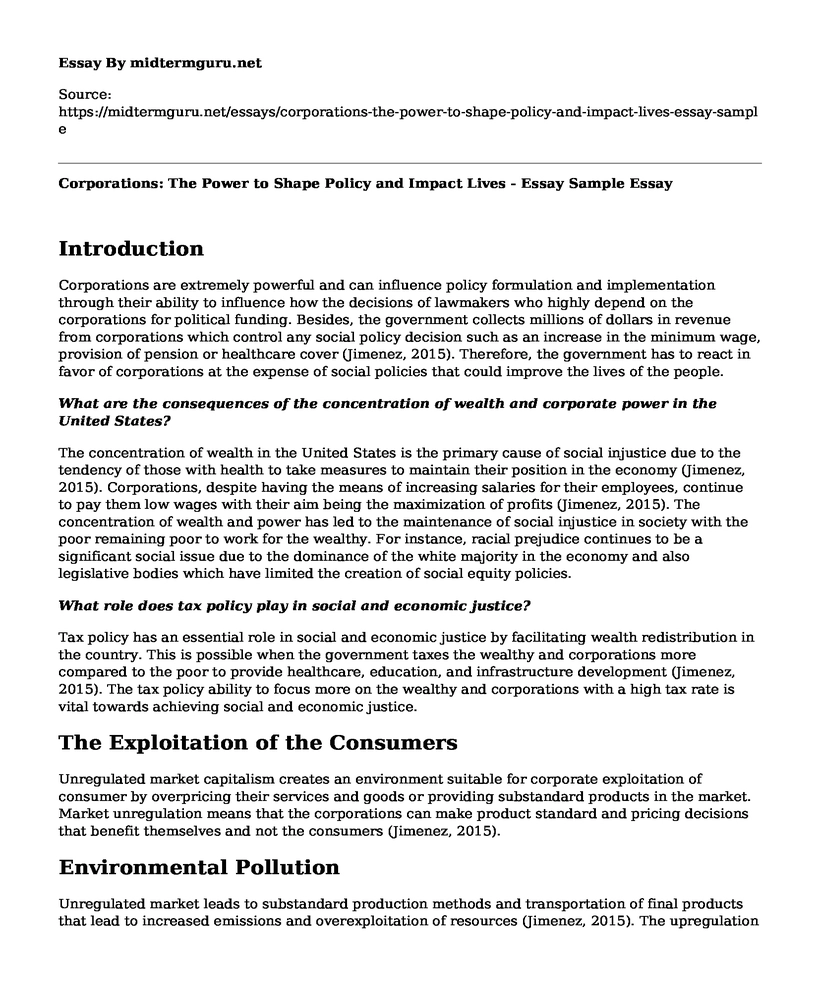Introduction
Corporations are extremely powerful and can influence policy formulation and implementation through their ability to influence how the decisions of lawmakers who highly depend on the corporations for political funding. Besides, the government collects millions of dollars in revenue from corporations which control any social policy decision such as an increase in the minimum wage, provision of pension or healthcare cover (Jimenez, 2015). Therefore, the government has to react in favor of corporations at the expense of social policies that could improve the lives of the people.
What are the consequences of the concentration of wealth and corporate power in the United States?
The concentration of wealth in the United States is the primary cause of social injustice due to the tendency of those with health to take measures to maintain their position in the economy (Jimenez, 2015). Corporations, despite having the means of increasing salaries for their employees, continue to pay them low wages with their aim being the maximization of profits (Jimenez, 2015). The concentration of wealth and power has led to the maintenance of social injustice in society with the poor remaining poor to work for the wealthy. For instance, racial prejudice continues to be a significant social issue due to the dominance of the white majority in the economy and also legislative bodies which have limited the creation of social equity policies.
What role does tax policy play in social and economic justice?
Tax policy has an essential role in social and economic justice by facilitating wealth redistribution in the country. This is possible when the government taxes the wealthy and corporations more compared to the poor to provide healthcare, education, and infrastructure development (Jimenez, 2015). The tax policy ability to focus more on the wealthy and corporations with a high tax rate is vital towards achieving social and economic justice.
The Exploitation of the Consumers
Unregulated market capitalism creates an environment suitable for corporate exploitation of consumer by overpricing their services and goods or providing substandard products in the market. Market unregulation means that the corporations can make product standard and pricing decisions that benefit themselves and not the consumers (Jimenez, 2015).
Environmental Pollution
Unregulated market leads to substandard production methods and transportation of final products that lead to increased emissions and overexploitation of resources (Jimenez, 2015). The upregulation of the market economy leads to the dumping of industrial waste in the environment, which negatively affects the environment biodiversity.
Unsafe Working Environment and Poor Employee Welfare
An unregulated market economy allows businesses to maximize their profits by eradicating costs such as the acquisition of safety equipment and investment in technology that can positively affect the safety of the employees (Jimenez, 2015). Besides, a decline in social spending by organizations can deny employees pensions, healthcare insurance, and housing which is not the case in a regulated market economy where the government seeks to balance both economic and social gains.
According to conflict theory, capitalist economic competition unfairly privileges the rich, who have the power to perpetuate an unfair system that works to their advantage. Individuals at the bottom of the social stratification have little opportunity to improve their situation since those at the top tend to have far more political and economic power.
Informal Employees
Factory workers, security officers, minors, plumbers, masons, and truck drivers.
Opportunities for Advocacy
- Health insurance and safety.
- High minimum wage.
- Housing.
- Job protection.
Most of the informal employment levels are not able to create associations which increases the tendency to be misused by their employers. Advocacy workers can significantly help such employees by voicing their concerns against arbitrary sacking, poor salaries, work safety, and healthcare (Jimenez, 2015).
References
Jimenez, J., (2015). Social Policy and Social Change: Toward the Creation of Social and Economic Justice. Los Angeles: SAGE, [2015]
Cite this page
Corporations: The Power to Shape Policy and Impact Lives - Essay Sample. (2023, Jan 18). Retrieved from https://midtermguru.com/essays/corporations-the-power-to-shape-policy-and-impact-lives-essay-sample
If you are the original author of this essay and no longer wish to have it published on the midtermguru.com website, please click below to request its removal:
- Sample of a Letter of Advice to President
- Essay on Effects of Trumps Election
- Examination of the Plight Market in Nigeria - Paper Example
- Sutter Health - Essay Sample
- Recruitment and Selection in Human Resource Management Decision Making - Essay Sample
- Two Standards of Culturally Competent Nursing Care: Social Justice & Critical Reflection - Research Paper
- Business Operations: Competitors, Suppliers, and Macro-Environment Factors - Essay Sample







